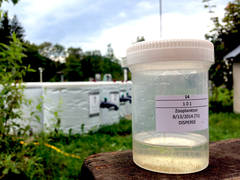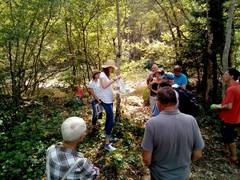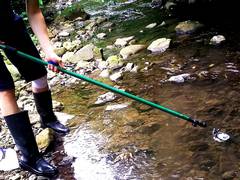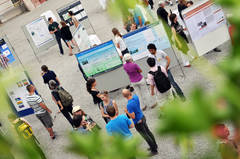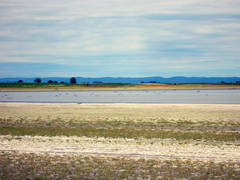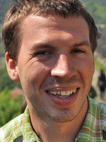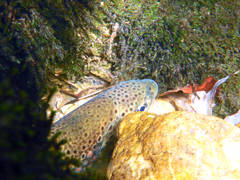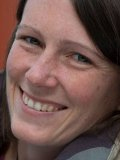In the context of global change and loss of biotic diversity, understanding relationships between diversity and ecosystem functioning has become mandatory. Therefore, it is necessary to investigate underlying mechanisms that generate and maintain diversity patterns across spatial scales. Theresa Lumpi wrote her master’s thesis about this topic and finished successfully in September.
In this study we examined the effects of ecological connectivity along with important environmental parameters on freshwater microbial communities. Experimental communities were established in 40 mesocosms (300 L) inoculated with water from three lakes in Lower Austria.
More than 220 guests visited WasserCluster at the open days on 2nd and 3rd September.
On the programme there were talks about Lake Lunz trough the ages, guided tours and hands-on experiments for kids and adults as well as a mini-excursion to our outdoor constructions. It was a pleasure for us, to host so many guests!
Within the project „PowerStreams“ two master students finished their theses in the end of August under supervision of Thomas Hein and co-supervision of Gabi Weigelhofer. Felix Bauer investigated the production of greenhouse gases in context with the pollution of streams. In the focus of Katharina Leitners thesis was the context between background ammonium concentration, season and ammonium uptake/ retention ability of streams. For both theses nine streams in Lower Austria were sampled in spring and summer 2015.
Around 140 researchers from 35 countrys came to the Kartause Gaming and to WasserCluster Lunz to the 18th Meeting of the international lake observatory network GLEON, which took place for the first time in Austria. The researchers discussed the changing of lakes all over the world in times of climate change.
In July started the cross-border coordination of ecological monitoring activities in the NATURA 2000 areas Neusiedler See and Hanság. In the course of this Interreg-EU-project WCL researcher Zsófia Horváth investigates soda pans.
Martin Kvarda wrote his master thesis under the title "Effect of floodplain restoration measures controlling hydrological connectivity on water quality and nutrient retention" under the supervision of Thomas Hein. In July he successfully finished his studies.
A new 3-year FWF project of Martin Kainz started in June under the title "Trophic pathways of omega-3 fatty acids in stream food". Results of this project will shed considerable light on the long-standing question of how consumers in headwater streams, but also in lowland streams, manage or fail to obtain essential nutrients and high quality forms of energy.
With her project "Competition and top-down control as potential factors controlling microbial diversity in aquatic networks" Katharina Besemer got the first PostDoc Fellowship of WasserCluster Lunz. In June she started with her work in our research center, where she will do research for two years.




